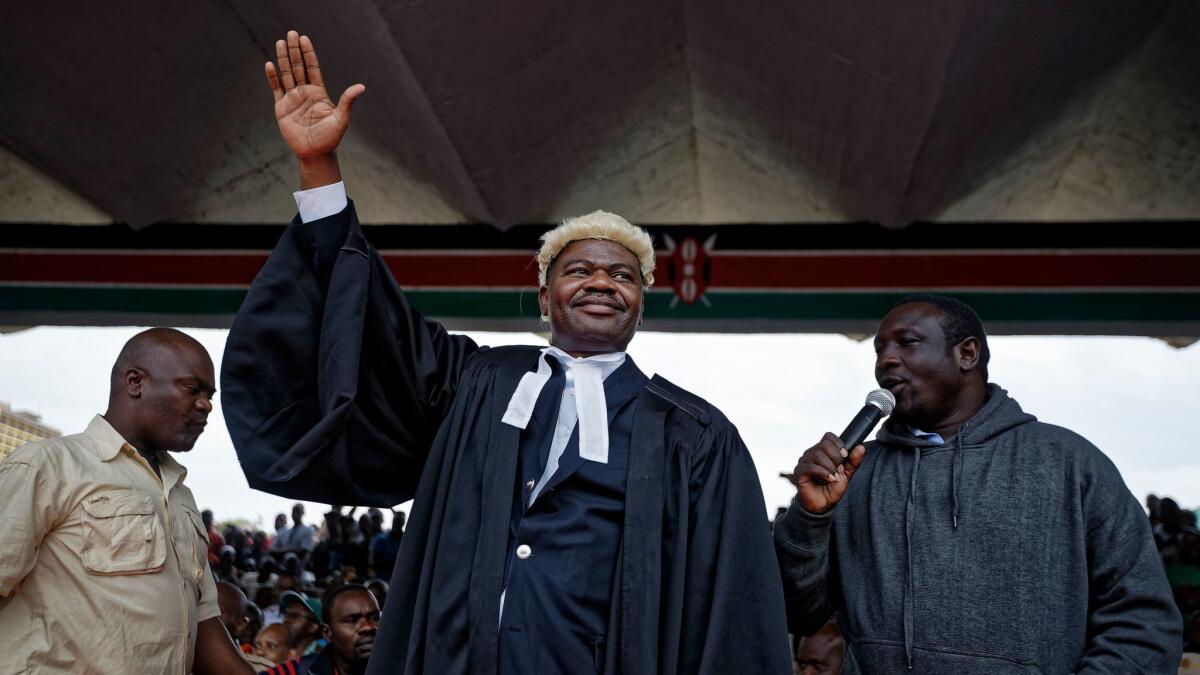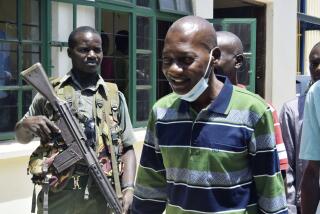Kenyan court suspends government shutdown of radio and TV stations, as journalists complain of harassment

Kenya’s reputation as a beacon of media freedom has suffered a dramatic setback amid a tough government clampdown and swirling rumors of planned arrests of journalists.
In recent decades, Kenya stood out in a region where journalists are often harassed or killed.
But several prominent figures from independent station NTV camped overnight Wednesday in their newsroom, fearing arrest and saying plainclothes police agents were waiting for them outside.
NTV Managing Director Linus Kaikai and news anchors Larry Madowo and Ken Mijungu said they had been warned they would be arrested.
Kenya’s high court on Thursday ordered the government to reverse its shutdown of three independent TV and radio stations that were blocked for covering opposition leader Raila Odinga swearing himself in as rival president on Tuesday.
The court ordered authorities to allow the networks to resume broadcasting, pending a court hearing challenging the shutdown in two weeks.
The government said Odinga’s action was treasonous and has threatened to arrest those involved. Interior Minister Fred Matiangi on Wednesday accused the stations that covered the swearing-in of complicity in an opposition effort to overthrow the government, claiming the broadcasts incited action that could have cost thousands of lives.
Matiangi’s decision to prolong the shutdown of the stations beyond the Odinga ceremony raised alarm bells in the East African nation widely known for its liberal media in a region of Africa where journalists face imprisonment and even death.
The government’s confrontation with the media stations comes after human rights groups complained of harassment in the wake of the disputed elections last year.
An election in August, annulled by the courts over irregularities, and a rerun election in October left the nation deeply divided. Odinga boycotted the rerun, arguing it would not be free and fair, and has since refused to recognize President Uhuru Kenyatta’s legitimacy.
The move to swear himself into office as the “people’s president” threatens to prolong Kenya’s political divisions.
The government action against independent media has been sharply criticized by Kenyan rights activists, amid fears the country could be taking a more authoritarian turn under Kenyatta.
Voting in Kenyan elections often runs along ethnic lines, and the nation is still haunted by ethnic clashes in the wake of another disputed election in 2007, also rejected by Odinga, who ran for president and was declared the loser at the time. Ethnic fighting flared in slum districts in Nairobi and swiftly spread across much of the country, killing as many as 1,500 people.
On Thursday, Kenyan activist Okiya Omtatah petitioned the high court to force the government to allow the media to operate freely, claiming the decision to shut down the broadcasts was unconstitutional. Judge Chacha Mwita ordered authorities to allow broadcasting to resume pending a hearing of Omtatah’s petition.
British High Commissioner to Kenya Nic Hailey said Thursday he had urged the government to allow the media to operate freely “not simply because it’s the right thing to do but because it contributes very strongly to the positive image that Kenya has in the world.
“One of the strongest things about this country — one of the reasons that so many investors are headquartered here, that so many people come here, that this country’s capital is the hub of the region and one of the hubs of the continent — is because of the open democratic free media and the sense that people from countries like mine feel at home,” Hailey told journalists Thursday.
Tom Mshindi, the editor-in-chief of the Nation Media Group, said the prolonged shutdown was a “very said moment for media freedom in this country,” and called on the media to stand together against harassment.
Kenyan analyst Murithi Mutiga of the International Crisis Group said it was a “remarkably draconian step” that recalled the authoritarian rule of former president Daniel Arap Moi, who governed from 1978 to 2002.
The crackdown has triggered fears that Kenyatta could follow the lead of neighboring leaders and adopt an increasingly authoritarian stance in his second term. Presidents in countries such as Rwanda, Uganda, Tanzania, Burundi, South Sudan, Ethiopia, Eritrea and others take a more rigid, closed, authoritarian approach, and activists and journalists are often imprisoned, harassed, beaten or killed. In Somalia, where Islamist extremists are fighting to overthrow the government, journalists often face assassination.
Several presidents in the region have manipulated constitutional term limits, designed to prevent leaders from ruling for life, in order to cling to office.
Kenya, the regional economic powerhouse, is a key ally in America’s counter-terrorism strategy in the region, alongside several of its more authoritarian allies.
Human rights organizations including the Kenya National Commission on Human Rights, Amnesty International, the Inter-Religious Council of Kenya, Article 19 and others have condemned the government’s move to block the broadcasts.
Twitter: @RobynDixon_LAT
More to Read
Start your day right
Sign up for Essential California for news, features and recommendations from the L.A. Times and beyond in your inbox six days a week.
You may occasionally receive promotional content from the Los Angeles Times.






